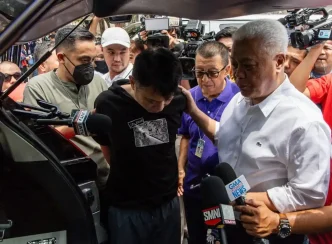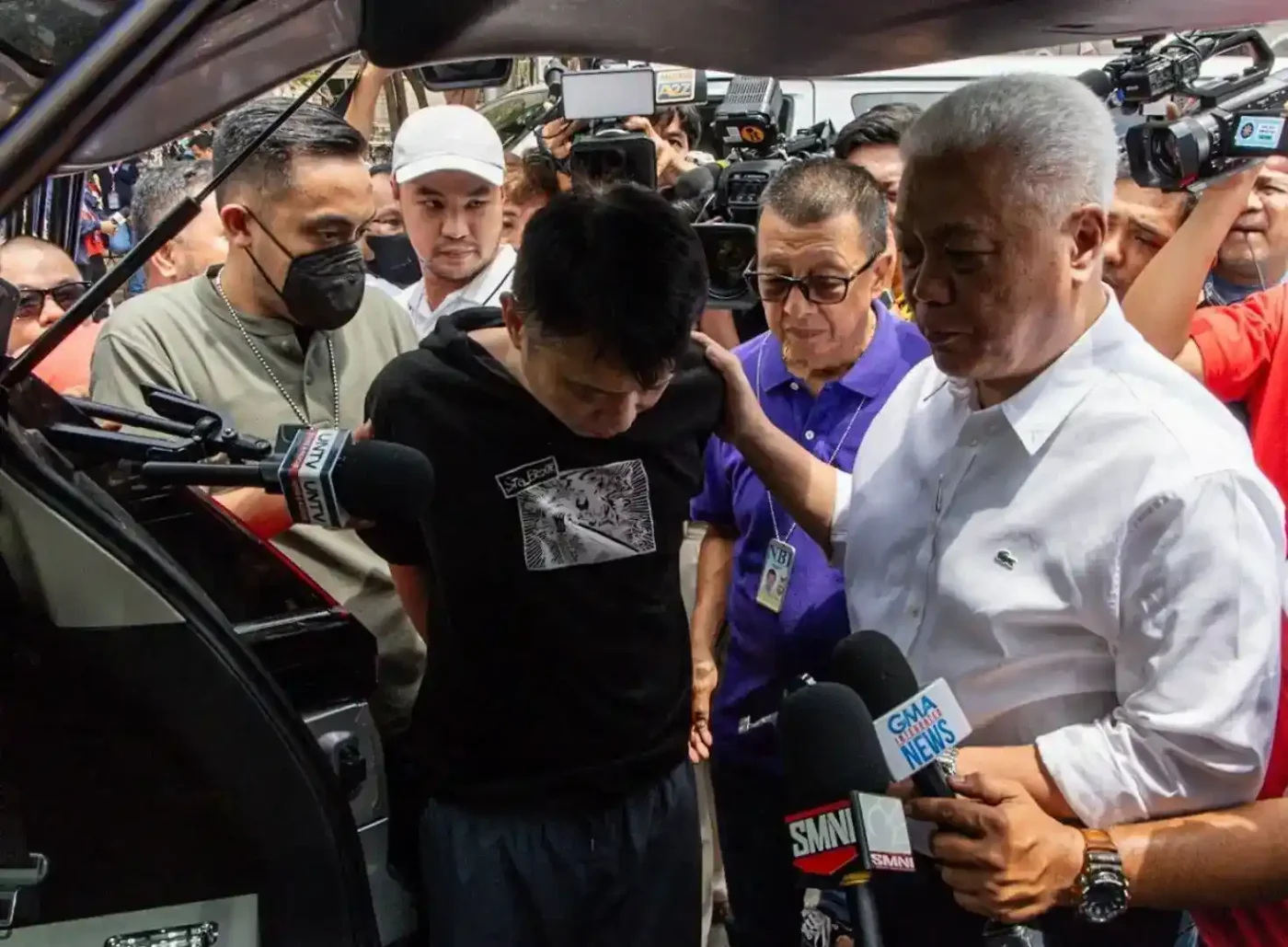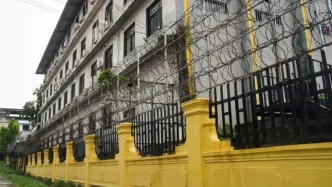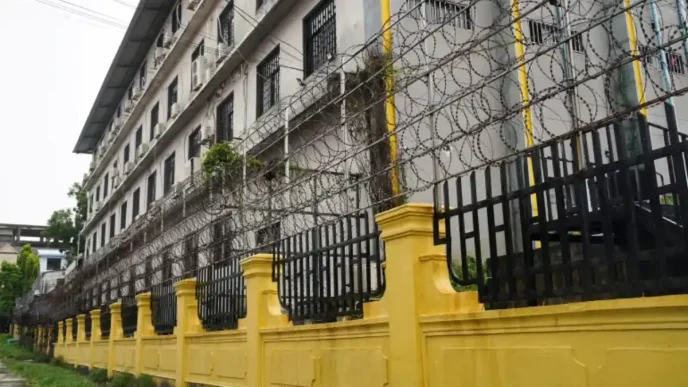In a development raising concerns about potential foreign interference in the Philippines’ upcoming midterm elections, a Chinese national was arrested on Tuesday in Manila’s historic Intramuros district, near the headquarters of the Commission on Elections (Comelec). The suspect, identified as Tak Hoi Lao, 48, and reportedly carrying a passport from Macau, a special administrative region of China, was allegedly found in possession of a telephone eavesdropping device known as an IMSI catcher, capable of intercepting mobile phone traffic.
Details of the Arrest
The operation was carried out by agents of the National Bureau of Investigation (NBI), who had been conducting surveillance on the suspect prior to his arrest. According to NBI spokesperson Ferdinand Lavin, the suspect’s presence near sensitive government facilities, particularly the Comelec headquarters at Palacio del Gobernador, prompted alarm among authorities. Lavin emphasized caution during an impromptu interview, stating, “We don’t want to jump to conclusions that they are obtaining sensitive information” but noted the significance of the location, which houses multiple government agencies.
The NBI is currently conducting a forensic examination of the seized IMSI catcher to determine whether any sensitive data was accessed. While the suspect’s identity has been partially disclosed, further details remain under wraps as the investigation continues.
Comelec Responds to Security Concerns
Despite the proximity of the arrest to its headquarters, Comelec chairman George Erwin Garcia sought to reassure the public that no critical data was at risk. “We don’t have any election data in our main [office], so there is nothing to be concerned about” Garcia told reporters. He clarified that the commission’s primary database is located in Laguna, away from the Intramuros office, and added, “We ran the test, nothing was compromised on any of our systems.”
Garcia’s statements aim to quell fears of a security breach, particularly as the Philippines prepares for midterm polls that have already drawn international attention over allegations of external meddling. However, not all stakeholders share the Comelec’s confidence.
Watchdog Raises Alarm
Kontra Daya, a prominent election watchdog group, expressed significant concern over the incident. Convenor Danilo Arao argued that the arrest should serve as a wake-up call for the Comelec. “The Comelec should be concerned as to why someone got arrested having such devices” Arao told INQUIRER.net via text message. He suggested that the poll body might be under surveillance by “nefarious characters, whether local or foreign.”
Arao also pointed to broader geopolitical tensions, noting, “There is reason to be alarmed given the accusations of Chinese foreign interference.” He called for a thorough investigation to uncover any potential involvement of local actors in what he described as an “obviously unauthorized stingray operation,” referring to the type of technology allegedly used by the suspect.
Context of Chinese Interference Allegations
The arrest comes amid heightened scrutiny of alleged attempts by China to influence the Philippine electoral process. Just last week, during a Senate hearing, National Security Council Assistant Director General Jonathan Malaya warned of possible Chinese meddling in the upcoming polls. Senate Majority Leader Francis Tolentino further alleged that China, through its embassy in Manila, had contracted a private company to operate a “troll farm” aimed at discrediting the Philippine government and prominent anti-China figures.
In response to these claims, Chinese foreign ministry spokesperson Guo Jiakun reiterated Beijing’s stance of non-interference. “We have no interest in meddling with the Philippine elections” Guo stated, emphasizing China’s adherence to principles of sovereignty and non-intervention. Despite these assurances, the timing of the arrest near a key electoral institution has fueled speculation and concern among Filipino lawmakers and civil society groups.
The allegations of interference are not isolated. A recent report by EU observers highlighted their mission to monitor potential foreign influence in the Philippine elections, reflecting international concern over the integrity of the democratic process in the country. While no concrete evidence has been presented linking the arrested individual to a broader state-sponsored operation, the incident has intensified debates over national security and electoral transparency.
Technology and Security Implications
The device allegedly carried by Tak Hoi Lao, known as an IMSI catcher or “stingray,” is a sophisticated tool often associated with espionage and unauthorized surveillance. These devices can intercept mobile phone signals, track locations, and even capture call and text data by mimicking legitimate cell towers. Their use is typically restricted to law enforcement and intelligence agencies under strict legal oversight, raising questions about how such technology came into the suspect’s possession.
Security experts note that the presence of such a device near a critical government facility like the Comelec headquarters could indicate an attempt to gather intelligence, though no confirmed breach has been reported. If forensic analysis reveals accessed data, it could have far-reaching implications for the security of the electoral process, even if the main database remains secure in Laguna. The incident underscores the growing intersection of technology and geopolitics, where digital tools can be weaponized to undermine democratic institutions.
Beyond the immediate incident, the arrest highlights the vulnerability of electoral systems to both domestic and foreign threats. The Philippines, like many nations, has increasingly digitized its voting and data management processes, making cybersecurity a critical component of election integrity. While the Comelec maintains that its systems are secure, the arrest serves as a reminder of the persistent risks posed by unauthorized surveillance and potential interference.
Broader Regional and International Context
The Philippines is not alone in grappling with concerns over foreign influence in its domestic affairs. Across Southeast Asia, nations have reported similar incidents involving alleged espionage or interference, often tied to broader geopolitical rivalries. China’s growing regional presence, through initiatives like the Belt and Road and maritime claims in the South China Sea, has heightened tensions with neighboring countries, including the Philippines, which has taken a firm stance against Chinese territorial assertions under President Ferdinand Marcos Jr.’s administration.
In this context, incidents like the arrest of Tak Hoi Lao are unlikely to be viewed in isolation. They feed into a narrative of mistrust and suspicion, particularly as the Philippines strengthens its military and diplomatic ties with the United States and other Western allies to counterbalance China’s influence. While Beijing denies any involvement in electoral meddling, the arrest could strain already tense bilateral relations, especially if further evidence emerges linking the suspect to state actors.
Public sentiment, as reflected in posts on social media platforms like X, shows a mix of concern and skepticism. Many Filipinos express alarm over the possibility of foreign interference, while others question whether the government is using such incidents to deflect attention from domestic issues. The polarized discourse underscores the challenge of addressing security threats without fueling unnecessary panic or xenophobia.
Legal and Ethical Dimensions
Legally, the arrest raises questions about the suspect’s intent and the potential involvement of other parties. Under Philippine law, unauthorized possession of surveillance equipment can carry severe penalties, particularly if linked to espionage or interference with government functions. The NBI’s ongoing forensic investigation will be crucial in determining whether charges will extend beyond possession to more serious offenses like data theft or conspiracy.
Ethically, the incident also prompts reflection on how such cases are reported and perceived. While the arrest is a matter of public interest, authorities and media alike must avoid premature conclusions that could prejudice the investigation or inflame anti-Chinese sentiment in the Philippines, where historical and geopolitical tensions already run high. Balancing transparency with caution is essential to maintaining public trust and ensuring a fair legal process.
Looking Ahead
As the NBI continues its investigation into Tak Hoi Lao and the seized IMSI catcher, the incident serves as a stark reminder of the complex challenges facing the Philippines as it approaches its midterm elections. Questions remain about the suspect’s motives, potential accomplices, and whether this arrest is an isolated event or part of a larger pattern of interference. With the Comelec under scrutiny to ensure a transparent and secure electoral process, the government faces pressure to address both the immediate security concerns and the broader implications for national sovereignty.
For now, the public awaits further details, while civil society groups like Kontra Daya call for vigilance. As the Philippines navigates this sensitive issue, the balance between safeguarding democracy and maintaining diplomatic relations will be tested, with potential ramifications far beyond its borders.
















